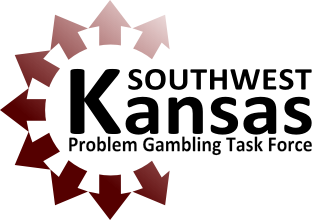| State and Community Coalitions Promote Awareness and Helpline Gambling is a popular form of entertainment for many Kansans. Planned expansion of casino gambling to Southeast Kansas, the fourth state owned venue, attests to the continued appeal of gaming and allure of upside economic impact it can bring to the host communities. There is, of course, another less appealing outcome: the harmful consequences for families when someone develops a gambling problem and the detrimental effects on personal finances and relationships, job loss, criminal activity, and even suicide. The stark contrast between those scenarios for communities and families warrants understanding the difference between responsible gambling and a gambling problem. That’s the premise of a statewide awareness campaign coordinated by the Kansas Alliance For Responsible Gambling and the focus of a tool for gamblers and their families that is highly predictive of gambling behavior that can put them at risk. The Kansas Alliance For Responsible Gambling and Kansas Coalition For Problem Gambling have partnered with the State of Kansas Department For Aging and Disability Services to provide information to Kansans who gamble, problem gamblers, their affected and concerned friends and family, and the community coalitions devoted behavioral health prevention programs and problem gambling treatment services. A self-assessment tool being promoted in the campaign is referred to by behavioral and mental health professionals as the NODS (National Opinion Diagnostic Survey) CliP, three direct questions that are highly predictive of whether a gambler has crossed the line into a gambling disorder. Like other disorders, friends and family may recognize the warning signs before the disordered individual themselves. In either case, gamblers and their families are encouraged to take a moment for self-‐assessment that could mean the difference between gambling being an enjoyable form of recreation and the distress brought on by problem gambling. The “CLiP”questions revolve around problem gamblers’ obsession with gaming and trying to stop, cut down, or control their gambling; and lying about gambling behavior and losses. The NODS CLiP questions and other similar diagnostics help gamblers understand if they’re in the zone of responsible gambling or are dealing themselves a losing hand. Among the resources is a website www.ksgamblinghelp.com where the diagnostic questions can be found as well as links to statewide and community information and contacts for counseling. At the center of those resources is the Kansas Problem Gambling Helpline 800-522-4700 where trained professionals are available 24/7 to answer questions about risks, treatment options, casino Voluntary Exclusion programs, and state reimbursement policy and resources for counseling professionals. For those who choose gambling as a form of recreation and their families it’s important to understand the warning signs that you or someone you care about might be at risk. These information channels are a convenient, confidential, and no-‐risk place to start. | |
|
0 Comments
Leave a Reply. |
SW Kansas
|


 RSS Feed
RSS Feed